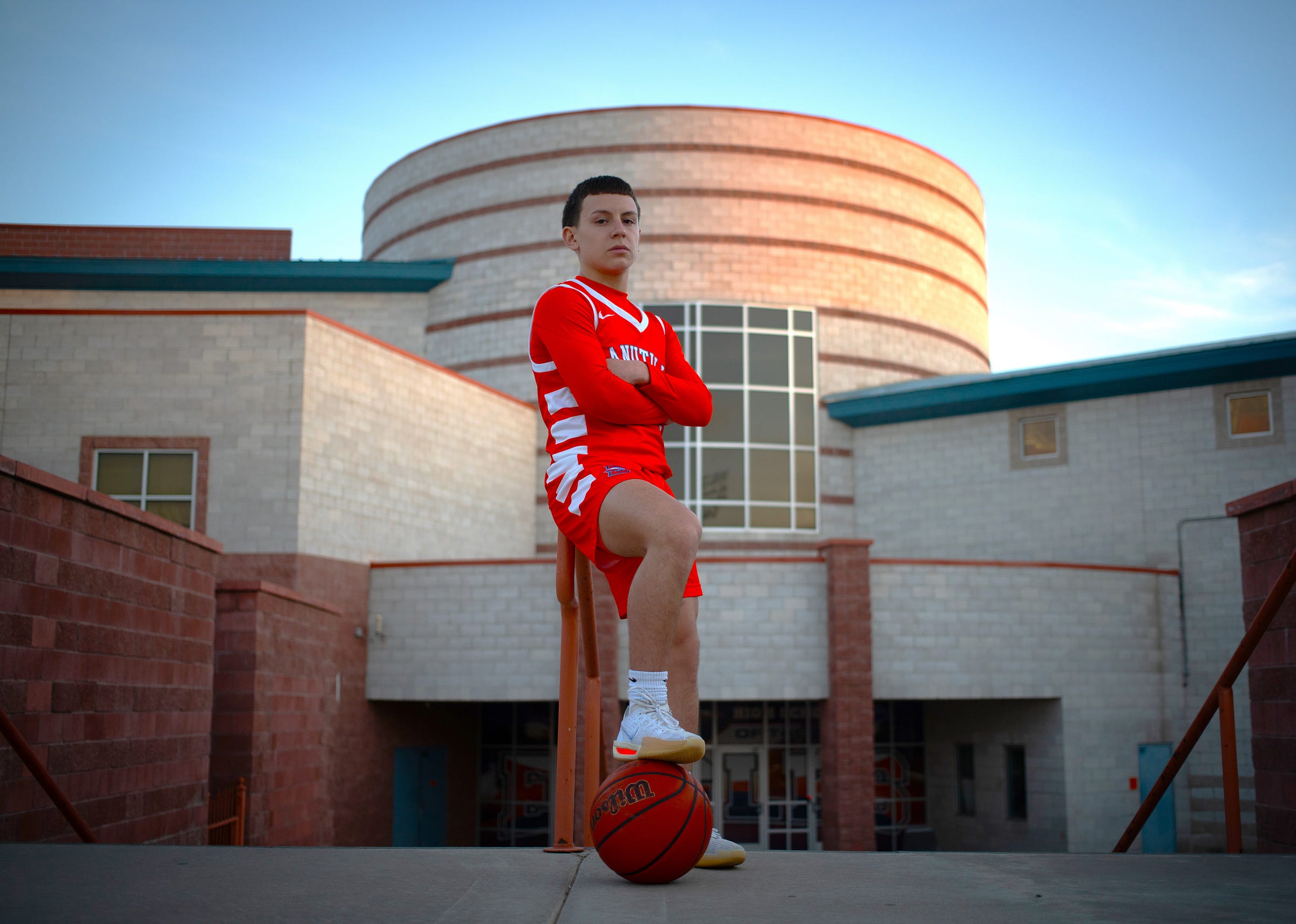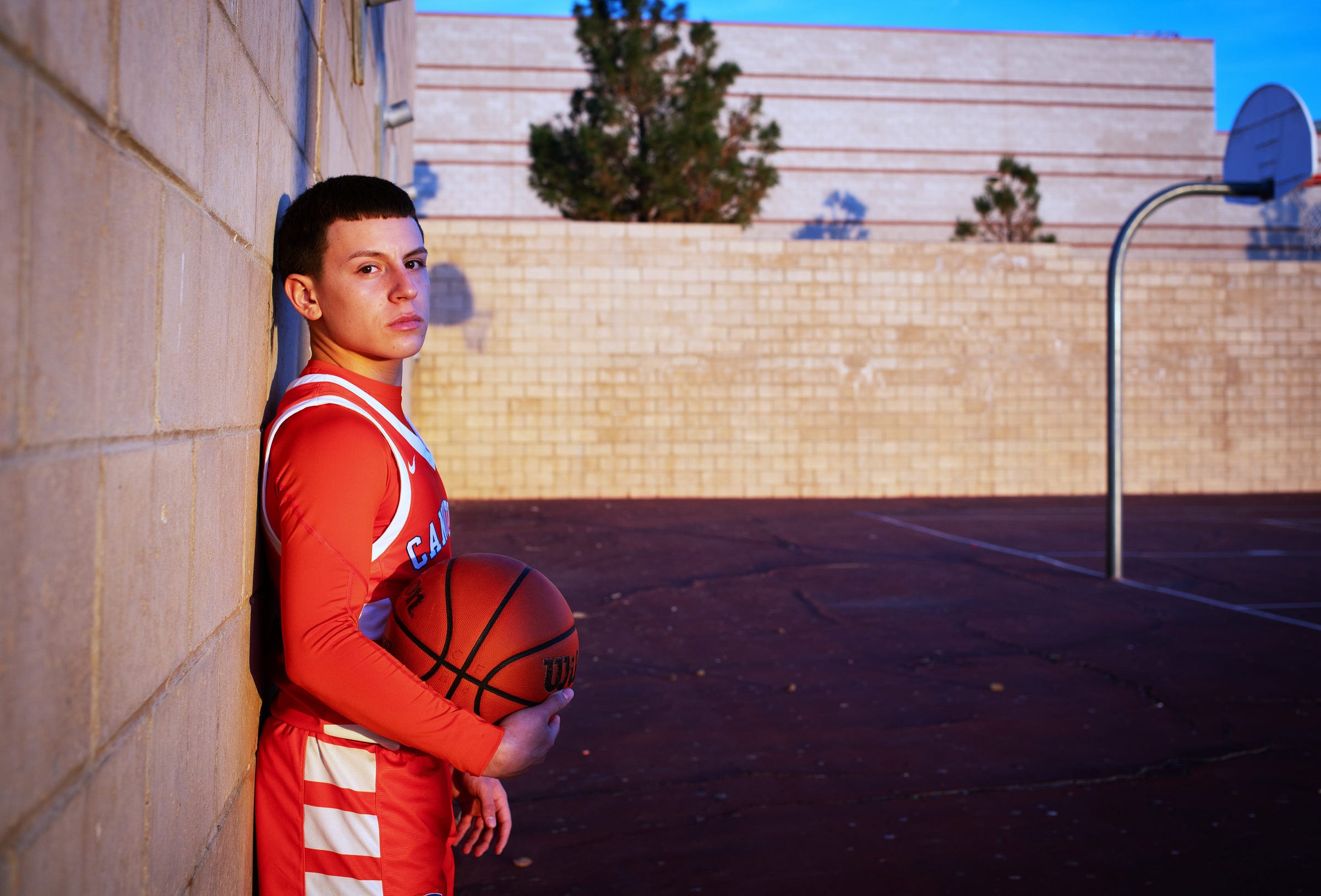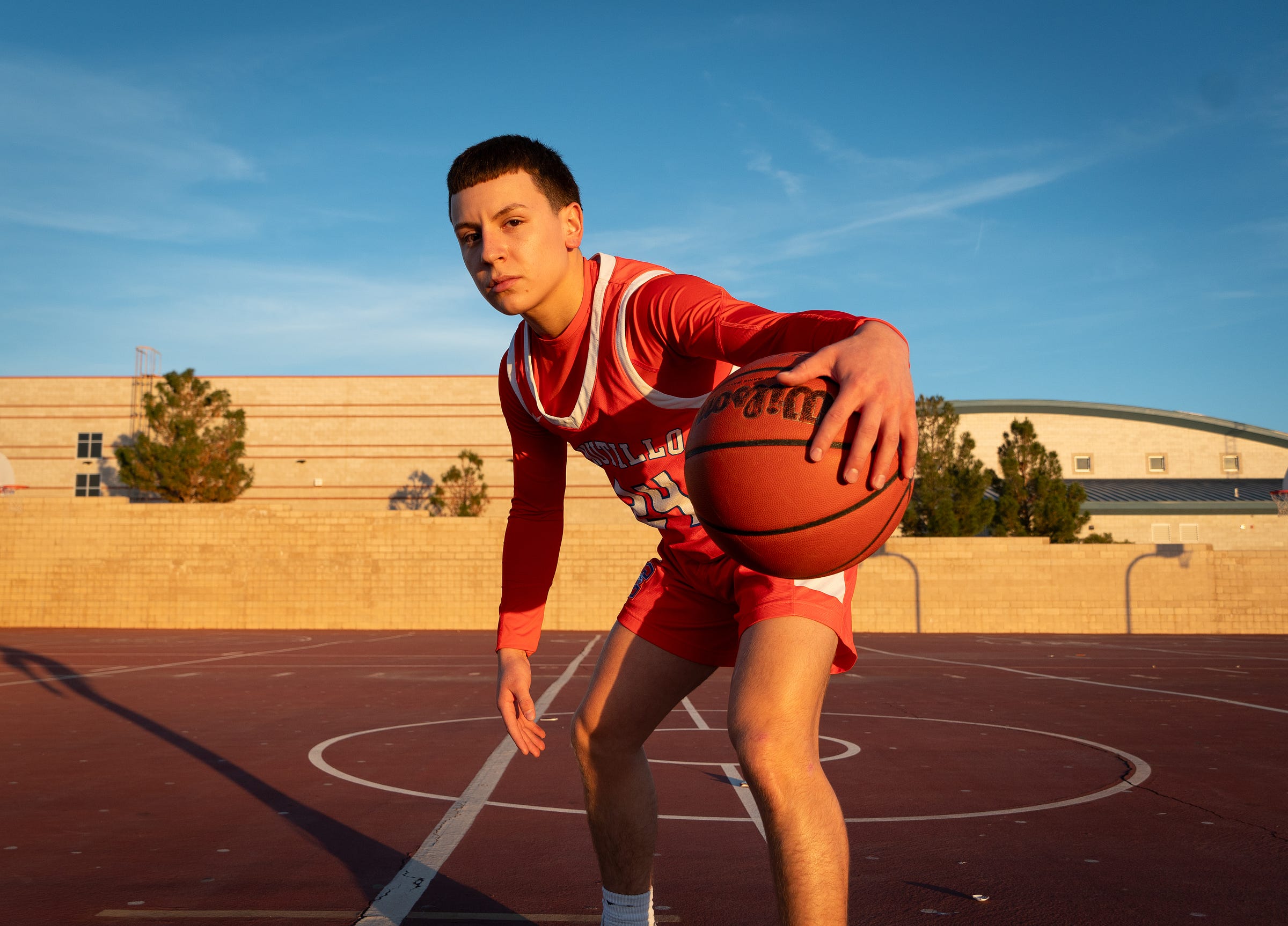No Low-Hanging Fruit: The Austin Bonilla Story
In a region built on being overlooked and underestimated, no player embodied its fight, fire, and resilience more than Canutillo’s 2025 floor general.
When I walked into a Canutillo boys basketball game, I should have braced myself.
But how would I know what I was about to see?
The first time I saw Austin Bonilla play, I was distracted.
He immediately stood out. His physicality and frame are unlike any prospect I’ve seen in boys high school basketball.
I start watching the game, and suddenly he’s the only player I’m watching.
How does he defend?
How does he handle ball pressure?
How does he get a shot off?
How did he just make that pass?
How did he make that other pass?
How did no one else see that pass?!
The game ends. I look at my notes. It’s all Bonilla. No one else.
It took a few games before I started watching Canutillo—not just Bonilla.
Let’s get the obvious out of the way: Austin Bonilla is short.
So short you can’t help but focus on it.
At 5-foot-3, he’s the smallest boys’ varsity player I’ve ever covered in the Borderland.
The dozens of people I interviewed for this story will all say the same thing:
Austin is more than just his height.
It’s low-hanging fruit.
Reductive.
Shallow analysis.
I agree.
And then I don’t.
Because if Bonilla were eight inches taller, sure—he might be seen as a better prospect. But then he ceases to be this.
He ceases to be the best facilitating point guard from El Paso County to Doña Ana County. And it’s not even close.
He gets his teammates easy buckets. He makes passes from every angle to every spot. Nothing is off-limits.
Even the audacious turnovers are exciting because you catch yourself wondering:
Did he really just try that?
Most guards at this level are still struggling with basic two-hand passing.
Meanwhile, Bonilla is dropping dimes to cutters through the smallest of margins.
One night late in the season at El Paso High, a defender picked Bonilla up just past the halfcourt line, trying to pressure the ball.
Bonilla crossed over left to right, then back again—tight, low, and controlled.
The defender fell and left the game shortly after with an ankle injury.
No celebration followed.
Bonilla just kept dribbling.
Eyes already scanning for his next pass.
I once again found myself looking around. Did anyone else just see this kid literally break someone’s ankle? Plays like that never made the highlight reels — but they always seemed to happen when you were watching him closely.
So yes—Austin Bonilla is more than his height.
But what gets left out is that his height is part of his brilliance.
It’s what makes him stand out.
It’s what’s forced him to find value beyond scoring.
It’s what makes him singular.
We say it’s not about height with Austin Bonilla.
But if we’re being honest:
It is.
Let’s go back roughly a decade and a half.
Fourteen years ago, before any high school records or college accolades, Sixto Bonilla walked up to an opposing coach before his daughter’s 8-and-under AAU game to ask a favor. His team didn’t have enough players to start the game. Would it be okay if his son, Austin — just four years old at the time — filled in?
The other coach obliged.
Austin, small even for four, had already been in gyms since before he could walk. He’d started playing a year earlier. In fact, he was so young that his parents had to sign a waiver just to get him on the court at their local recreation center.
Austin played the whole game.
His team won.
During the game, his older sister Alyssa sharing the court, coached him through possessions — a scene that would repeat itself many times over the years.
“He’s been in the gym since he was born with Alyssa,” said Yvette Bonilla, their mother and a former Riverside Ranger herself, who once scored 1,000 points in her own high school career. She watched her two children develop a closeness that even she can’t fully explain.
“I can’t even explain it,” Yvette added. “I have an older brother, and I love him, but the bond that Alyssa and him have is like no other.”
To understand Austin Bonilla is to understand his sister.
Alyssa, several chapters ahead, recently wrapped up her career at Missouri Western, where she delivered an exceptional senior season. She led the Griffons in points, assists, and steals, earning First-Team All-MIAA honors and a spot on the conference’s All-Defensive Team — a rare combination in one of the strongest Division II conferences in the country.
In 120 career games, Alyssa finished third in program history in career assists, tied for third in steals, and sixth in games played. Her senior year stands as one of the most impressive individual seasons by an El Paso native in recent memory.
But her path wasn’t without turbulence. Early in her Missouri Western career, Alyssa considered walking away from basketball. One of the reasons she stayed? Her younger brother.
She felt she needed to keep setting the example.
Just as she had done when Austin first stepped onto the court at age four. Just as she did in their countless one-on-one driveway battles that ended with arguments over supposed fouls. And most importantly, just as she did during the COVID-19 pandemic.
“She became his mom,” Yvette said. “Sixto and I had to work crazy hours because of COVID. Sometimes I was out by five in the morning and didn’t come back until nine at night, it just depended on work. Sixto the same way. She really raised Austin for those couple of years. She made sure he was fed. She made sure he went to workouts. We did everything else for them and made sure we were there in any way we could. But they did everything else. I can’t take credit, and neither can Six, for what they do off the court.”
In many ways, Alyssa’s example didn’t just raise Austin — it shaped the player he would become: responsible, steady, accountable, and always thinking beyond himself.
When Austin and Alyssa describe their relationship, their words mirror one another. Interviewing them separately, their tone, vocabulary, even their shared speech patterns — peppered with the same intonations and casual punctuations of “like” — made it feel, at times, like speaking to the same person.
On film, the parallels are equally clear: the pass-first mentality, the speed with the ball, the timely steals leading to fast breaks.
And even beyond basketball, the paths continue to align.
Alyssa chose Missouri Western not only for basketball but also for its respected nursing program. Austin plans to follow a similar track: basketball and nursing.
The parallels don’t stop. They rarely have.
By the time Austin Bonilla reached high school, Canutillo head coach Larry Morales already knew what kind of player he had coming.
“I first met him probably when he was a sixth or seventh grader,” Morales said. “He was relentless. He was a lion.”
Bonilla’s size always caught attention first, but for Morales, it was irrelevant. The instincts, feel, and court vision were impossible to ignore.
“His sophomore year, I just felt like there was no way I could leave him off varsity,” Morales said. “He was just too good. I remember telling my assistant at the time, Coach Olivas, if anyone only sees his size, they don’t know anything about basketball.”
Injuries to Canutillo’s veteran guards opened the door for Bonilla to take on a starting role as a sophomore—and he didn’t flinch. What started as a role player slot quickly evolved into something more. By junior year, Bonilla was the primary engine of the offense. By senior year, he was Canutillo’s most valuable player.
“He plays with so much heart and attacked the offseason with that same passion,” Morales said. “He really improved his junior and senior year.”
“If you think more about the team, that team is going to be successful,” Austin said. “If you think about how, you can impact the game without being all about yourself, the team is going to go further, and you are going to be more successful.”
In Bonilla’s final season, Canutillo reached the Regional Semifinals, a special postseason run that few El Paso schools achieve.
“I want his senior year to go as long as possible,” Morales said back in late January.
Morales trusted Bonilla completely to orchestrate Canutillo’s offense, especially after the team implemented a new system his senior year.
“He’s a coach on the floor and he’s made me better,” Morales said. “This new offense that we’ve been doing—he makes it go; he makes it beautiful, he makes it work. There are times he does too much, but that’s his confidence and best quality. He does a lot and to tell him to back off is hard because he knows no other way.”
There were moments where Morales and Bonilla would call out the same play at the exact same time — both seeing the floor unfold before them. It was further proof of what Morales already knew: Bonilla wasn’t just running the offense — he was coaching it as he played.
Morales doesn’t hesitate when asked to sum up his point guard’s mentality.
“You don’t want to take that away because that is his greatest attribute—he’s not scared and he’s not going to back down,” Morales said. “He’s one of the region’s best assist men and one of the best point guards in the state. We’re lucky to have him.”
Statistically, Bonilla’s passing brilliance is evident, but for Morales, the numbers hardly tell the full story.
“Not one assist stands out. You can’t pick one—hundreds,” Morales said.
And yet, the height conversation lingers.
“He’s a point guard that is undersized and that’s it,” Morales said. “It’s something to talk about obviously, but there are a lot of people who are 6-foot-3 who have no game, no heart, and don’t have his basketball IQ. We don’t ever start there with those people.”
Beyond his play, what Morales admires most is Bonilla’s humility and presence within the program. Much of Canutillo’s egalitarian scoring model that can feature a different leading scorer every game centers back around Austin and his selflessness.
“He’s absolutely one of my favorites because he works hard. He’s selfless—a learn-it-all, not a know-it-all. He’s one of a kind,” Morales said.
“We all have each other’s back, we all play for each other, with each other,” Austin said. “We don’t care who scores, we don’t care about stats, we care about the outcome of the games.”
As Bonilla’s high school career comes to a close, Morales knows one small thing he’ll miss most:
“I’m going to miss him bringing the ball down the court.”
Now, let’s circle back to the one thing very few wanted to talk about: Austin’s height.
I interviewed more than a dozen people for this story. The subject of his size was often handled delicately. Some saw it as irrelevant. Others, like me, saw it as inseparable from what makes him so good.
Because he mirrors exactly what the Borderland produces: undersized, under-recruited, and underappreciated players — who are still really good.
Talk to Austin, and you’ll meet a soft-spoken, self-effacing young man. He won’t take credit for wins, but he will for losses. It’s never a great pass he made; it’s a great finish by his teammate. The team succeeds as a group — never because of him.
At first, it reads as humility. But sit with it longer, and it feels like deflection. It’s as if acknowledging his own skill risks inviting attention, he’s spent years conditioned to avoid.
When I pressed, little was excavated. Simple questions — Why are you so humble? How good are you? — were met with uncomfortable shrugs: I don’t know. I don’t think about that stuff.
The same with his height.
But the more Austin and others deflected, the more convinced I became that it mattered. How can a kid who lives inside a 5-foot-3 frame — and is constantly reminded of it — never think about it?
Even his sister Alyssa, who knows him better than anyone, acknowledges what lingers beneath.
“I wouldn’t even know but I just feel like he has so much to prove to everyone because of his height, so he doesn’t feel like he has room to say anything,” she said referencing his uncanny humility. “But that is what keeps him humble and so good, because he shows it on the court, and doesn’t have to verbally say it.”
It seems to me that Austin has found comfort inside the thing most would run from. His invisibility becomes both his fuel and his shield. He’s never sought attention. Maybe he never had the conditions to crave it.
And yet, his height has directly shaped who he’s become as a player. Alyssa put it simply:
“His height has a lot to do with the player he is. If I were watching him and didn’t know him, he plays like he’s the tallest kid on the court but he’s not. So that is why he is so humble because he is trying to prove to everyone that he can do it even though he is shorter than everyone else.”
That foundation started early. His parents, Yvette and Sixto, rarely allowed participation trophies. If a team of 12 got only 10 medals, their kids would give up theirs. They taught resilience, accountability, and self-sufficiency.
It’s how Alyssa could step into a parental role during COVID. It’s how Austin could wake up at 5 a.m., drive across town for pre-dawn workouts with strength coach Paris Wall, then head to school and practice without complaint.
Now, he’s charting a new path at Northern New Mexico College — a program that saw past the obvious — while pursuing nursing, just like his sister did. Austin was fully prepared to give up basketball entirely and attend UTEP for nursing until Northern New Mexico called. He simply needed someone to believe.
And yet, after two years of evaluating this region’s best players, I still find it wild how many college programs couldn’t see past the obvious.
There’s an irony to it. Austin Bonilla never sought the spotlight. But no one represents Borderland basketball more than him.
He is Borderland Basketball.
Singular. Small. One of one.
That’s Austin Bonilla — no low-hanging fruit.







